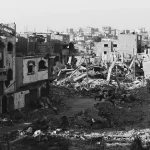The recent seizure of 1,200 kilograms of spoiled meat in Srinagar has sent ripples of alarm across the Valley , and rightly so. The idea that such a large consignment of decaying, potentially harmful meat could have entered our food supply chain is not just disturbing, it’s a wake-up call.
The swift action by the Food Safety Department and allied enforcement agencies deserves applause. But while the legal gears must turn, this story shouldn’t be limited to the headlines. It should echo in every home, because this isn’t just about spoiled meat,it’s about a spoiled mindset, a rotting culture of impatience, and our growing disconnect from ethical consumption.
Yes, the violators must face the law. Yes, regulatory oversight needs to be stricter. But here’s an uncomfortable truth we, the consumers, are not innocent either. We have unknowingly and sometimes knowingly become part of a culture that enables such lapses.
Let’s take a closer look at ourselves. When we go to the market to buy chicken or mutton, how many of us say, “Please keep it ready before I arrive”? We call ahead, rush the seller, and pick up meat without asking any questions. We don’t ask when the animal was slaughtered, whether it was freshly prepared, or if hygiene standards were maintained. In fact, we rarely even observe the environment where it’s being stored. We just want it quick, clean-looking, and packed without delay.
But haste has a cost. In this case, the cost is health. And the deeper cost is our complacency.
We live in a time where we want everything “ready-made.” From food to services, our default demand is speed. At fruit stalls, we ask for ripened bananas that look perfect even if they’re force-ripened using harmful chemicals. In pharmacies, we prefer over-the-counter relief rather than medical consultation. We demand pre-cooked meals, pre-washed vegetables, even pre-marinated meats. We have outsourced our trust and safety for the sake of convenience and time.
Even worse, in this culture of hurry, we have lost the art of asking questions. When was the last time we asked a seller if the storage facility was licensed? Or whether proper refrigeration was used during transport? We don’t. Because asking takes time. And we are always in a rush for work, for errands, for life.
But food safety is not just a regulatory issue it is a shared responsibility. Producers must be ethical, sellers must be honest, regulators must be vigilant, but consumers we the people must be aware and assertive. If we fail to ask, we silently permit. If we fail to inspect, we silently accept.
The 1,200 kg of rotten meat seized in Srinagar is only one example. Tomorrow it could be adulterated milk, fake spices, or expired medicines. And until we, as a society, begin to uphold integrity over urgency, we will keep facing these crises in different forms.
Our elders lived with limited resources but greater caution. They would examine vegetables closely, smell the rice, wash the meat with care, and even ask about the source. Today, we have apps to deliver food but no time to check its origin. Somewhere along the path of progress, we’ve lost our instinct for safety and our patience for process.
We don’t need to become paranoid just more conscious. Basic actions like buying from verified sellers, demanding bills, checking expiry dates, and spending a few extra moments to verify quality can go a long way in preventing such tragedies.
Perhaps this incident should prompt a broader conversation in schools, mohallas, mosques, and familiesabout the importance of food ethics and collective vigilance. Public health is not just the government’s responsibility; it’s a community’s lifeline.
Let us not only condemn what was found in that cold storage in Srinagar. Let us examine what we store in our own habits, in our own choices, and in our own expectations. Because when meat turns rotten, it’s not just the flesh that stinks it’s a sign that somewhere, our conscience has stopped questioning.
(Author is a Library Futurist and a researcher. Email:- [email protected])







